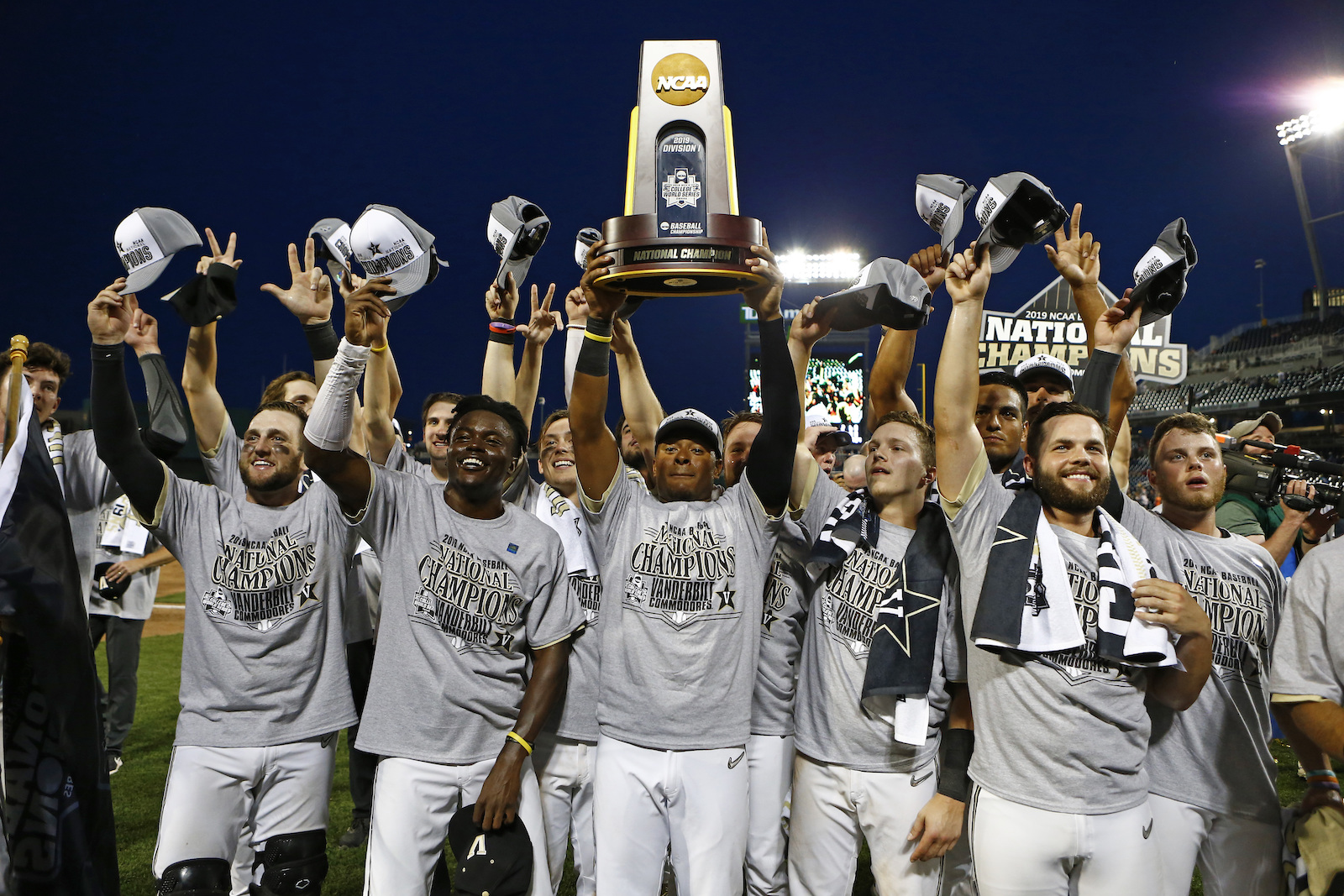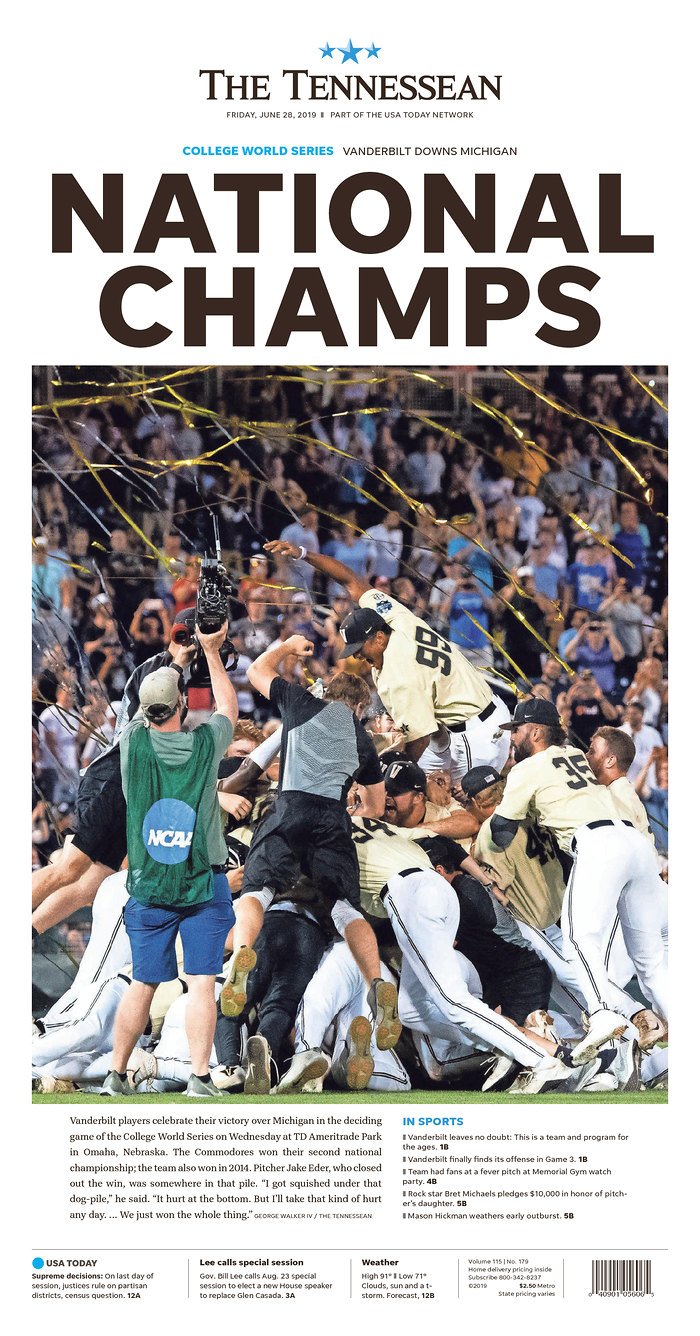
When journalists wants to argue that print has a long life ahead of it, one common move is to point to the enormous demand that arises for printed paper the day after the local sports team has won a championship. “See?” they’ll say, attaching a picture of diehard fans lining up for a broadsheet souvenir to hang in the den back home. “You can’t do that with a website!”
It’s pretty hard, it should be said, to build a sustainable business model off of hoping each of your hometown squads can win every title every year. But it’s absolutely correct that a daily’s print edition after a climactic win is a uniquely valuable artifact — a physical manifestation of the bond between newspaper and community, a memento for a thrilling spike of civic pride.
On Wednesday night, Vanderbilt’s baseball team won the College World Series, beating Michigan 8-2 in the final game. So, naturally, its hometown daily, The Tennessean, went all out to celebrate; here’s Thursday’s Page 1:

Hmmm. Well, okay, that top story is about a mayoral debate — an important story, I’m sure, though I probably would have expected to see the Vandy victory up top. Look down the page and aha! There’s the story. But wait: There’s no score. No winner. No nothing! Well, there’s this note:
Wednesday’s game started after the newspaper’s print deadline. Head online for coverage, including analysis from columnist Joe Rexrode and photos.
So the game started after the paper had already been put to bed. (Are they playing the College World Series in Singapore these days? Nope, still Omaha.) Well, I guess that’s the NCAA’s fault for starting a game so weirdly late, lemme see when…
And the game was over by 9:15 Nashville time?
The final chapter: Written. ✍️
VANDERBILT ➡️ NATIONAL CHAMPIONS!
#CWS | #VandyBoys pic.twitter.com/HMFcKNSehY— Vanderbilt Baseball (@VandyBoys) June 27, 2019
So we have a national championship won by the local team — and there’s nothing about it in the next day’s paper. Because it started — at 6:00! — after the deadline to go to presses.
(And come to think of it, take a look at the mayoral debate story again. The debate happened Tuesday night; this is Thursday’s paper.)
The Tennessean is a Gannett paper, and I’ve written about this insane policy at Gannett papers before. (Nearly all dailies have moved up print deadlines in recent years, but Gannett’s seem to be especially egregious.) Back on a very consequential Election Day in November, Gannett papers went to bed before even a single result could be reported. So anyone relying on their newspaper to tell them the winners would have had to wait roughly 36 hours after polls closed.There are lots of reasons why print deadlines have moved up. If the next day’s paper has to be finished at 6 p.m., you don’t have to pay as many copy editors and reporters to work that evening shift. More newspapers now outsource their printing (as opposed to owning their own presses) and chains have consolidated printing for a whole region’s worth of newspapers in a central facility — which leaves less flexibility for production. And that printing press is probably farther away than it used to be, and driving those trucks takes time. (New Orleans’ Times-Picayune, which will publish its final edition soon, is printed two states away in Alabama.)
But damn it, if you’re going to keep jacking up the price for your remaining print subscribers, and if those diehards will continue to provide the majority of your revenue for years to come, you have to give them a decent product.
How Gannett is destroying its most lucrative audience in just one page — today's Tennessean [/1x] pic.twitter.com/ZC23XglNz4
— Steve Cavendish (@scavendish) June 27, 2019
They’re nearly all gone, but the most common type of daily newspaper in America used to be the evening paper, which would usually hit newsstands sometime in the late afternoon. In 1940, evening papers outnumbered morning papers 1,498 to 380. The main culprit for their demise was the arrival of TV and evening newscasts, but even as late as 1988, they still outnumbered morning papers 2-to-1.
The appeal of the evening paper was that it could catch you up with had happened during the day while you were still in it. Today’s news, not yesterday’s. If you were lucky, you could get final closing stock prices from the NYSE, box scores from baseball day games, and what the mayor said at that morning press conference.
What Gannett and other companies are doing with these early press times is transforming their morning papers into evening papers — but evening papers that always happen to get delivered about 12 hours late.
The Tennessean did eventually get Vandy’s title in the paper — this morning, about 36 hours after the game started. I’m sure there are people in Nashville who are setting aside today’s paper to save, or maybe to frame. But championships only come so often. Cost-cutting newspaper chains are delivering an inferior product every single day.
